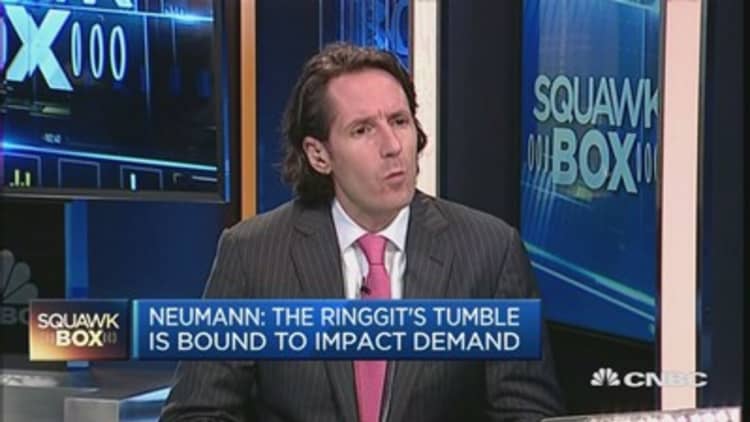
A weaker currency is usually perceived to be good for the economy; exports get a lift as shipments become more competitive abroad while some consumers are weaned away from costly imports to goods produced in-house.
Such a scenario should therefore be music to the ears of policymakers in Malaysia, for instance, where the local currency has been droopy for a while now, amid graft allegations against Prime Minister Najib Razak as well as a rout in commodity markets.
Read More Warning: EM bounce will be short-lived
Except it isn't. Frederic Neumann, Co-head of Asian Economics Research at HSBC, notes that in many emerging markets, a swift depreciation of the currency can actually hurt growth prospects.
Such headwinds typically play out in two ways. Firstly, a rapidly falling exchange rate pushes up local market interest rates as cash flees outside the borders.
Evidence suggests that in periods of excessive stress in currency markets, the amount of capital as a share of economic output that leaves emerging markets is greater than in the case of developed markets. As a result, domestic financial conditions tighten and borrowing costs rise.
Secondly, a currency in freefall also raises concerns over macroeconomic stability and limits risk appetite. In such a scenario, the amount of money lent by banks can fall by a greater amount than a simple increase in interest rates.
"The context matters, too. If, to begin with, growth is highly credit intensive, with debt driving consumption and investment, then the impact of tightening in financial conditions on growth can prove severe," Neumann says.
"In addition, if overseas demand is lackluster, the fall in the currency may lead to only a limited pick-up in exports. Unfortunately, most of emerging Asia is currently facing both conditions," he said.
So are all emerging market countries equally susceptible? No, notes Neumann.
Read More
He expects a marked tightening of financing conditions in Malaysia to adversely impact demand in the coming quarters. Indonesia and India, on the other hand, should be hurt less given the smaller debt pile in the former and somewhat more orderly forex moves in the latter.
"Fortunately, exchange rates have fallen while US dollar rates have remained relatively stable (with the latest Fed decision postponing a climb in overseas funding costs). But once these start to rise, local financial conditions in emerging markets are bound to tighten further," Neumann said.

